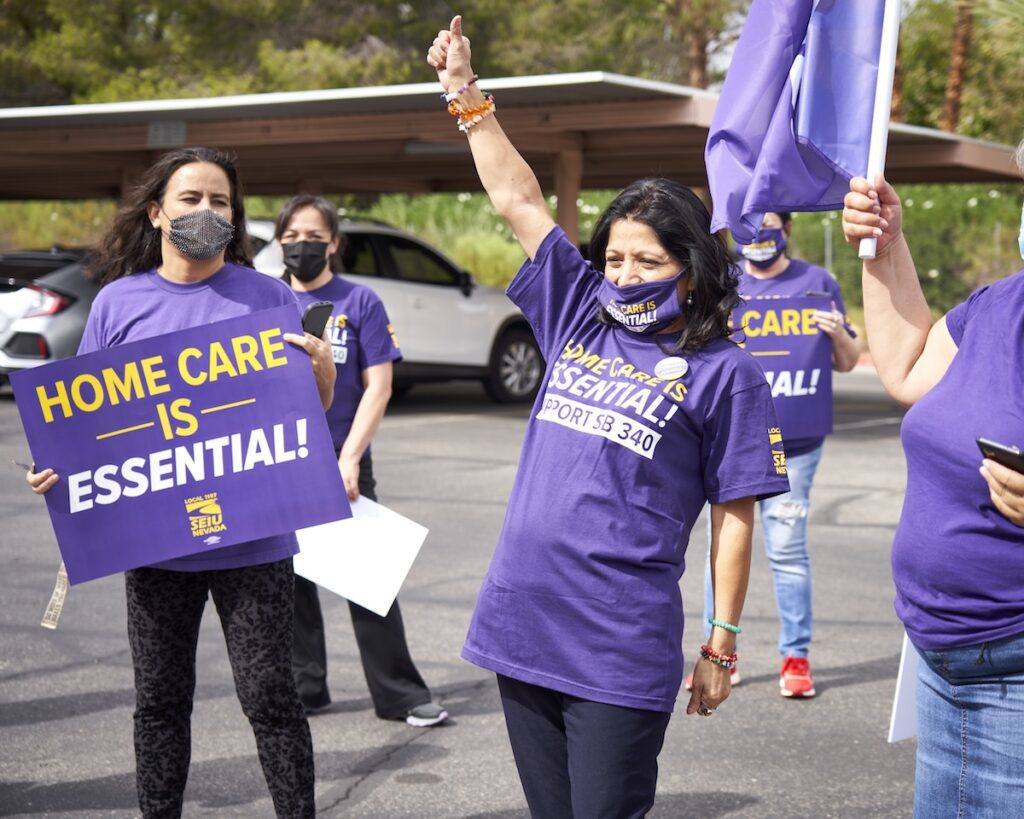
Photo courtesy of SEIU Local 1107
Seniors have officially outnumbered children for the first time in US history. But Nevada’s new minimum wage increase for care workers offers a model to address a looming crisis.
A groundbreaking minimum wage increase for Nevada’s home care workers has dramatically improved workforce stability, offering potential solutions as America faces an unprecedented demographic shift in which seniors outnumber children for the first time in history.
The Nevada Department of Health and Human Services (DHHS) study found major improvements in recruitment and retention since implementing a $16 minimum wage in January 2024. The state added 1,528 new caregivers—a 6.5% increase in just four months—while worker retention soared to 96%, compared to previous years when one out of two Nevada home care workers left within their first year.
“For $11 an hour, seniors simply couldn’t find anyone to take care of them,” explained Sallie Crider, a Las Vegas-based caregiver with over 40 years of experience. “Now there’s more skip in my step. What stuck with me was that this was just my calling—the harder cases have never been about pay, but about serving the client.”
The wage increase came after decades of stagnation. Before the 2023 legislation, Nevada’s 13,000 home care workers had been stuck at around $11 hourly for ten years, with funding unchanged for almost two decades. The crisis particularly affected the state’s rapidly aging population, which saw a 58% increase in residents 65 and older from 2010 to 2020.
Union organizing played a crucial role in the changes. Over 1,000 workers at nine agencies voted to unionize in 2023, leading to additional improvements.
MORE: Home caregiving can be expensive, thankless work. Nevada Sen. Jacky Rosen is trying to change that.
“Union agencies are the only ones that raised wages above the $16 minimum,” noted Chrystal Taylor, a Las Vegas caregiver. “We went from $16 minimum wage to $17 with our union contract, and now we don’t have to pay for background checks, physicals, or training.”
The initiative’s success stems from increased Medicaid reimbursement rates through the state budget. Agencies now receive approximately $25 per hour compared to the previous $17.56, allowing them to sustain higher wages while covering operational costs.
Despite these gains, Nevada still ranks 49th nationally in home and community-based services spending per resident. A single home care worker in Las Vegas needs over $24 hourly to meet basic living costs.
“I’m still living paycheck to paycheck,” Taylor said. “We’re pushing for $20 in the 2025 legislature because it’s about survival—keeping food on the table for my three kids and ensuring I can get to my clients.”
State Sen. Rochelle Nguyen (D-Las Vegas), who chairs the legislature’s Finance Sub-committee on Human Services, sees the wage increase as fiscally responsible.
“Nevada saves $76,000 annually for each client receiving home care instead of nursing home placement,” she noted. “My grandfather relied on dedicated home care, and soon my aging father may need the same support. This is deeply personal for many Nevada families.”
The issue enjoys rare bipartisan consensus in today’s polarized environment. A recent poll showed 80% of likely voters concerned about the workforce shortage, with 85% supporting wage increases. Support crosses party lines, with 91% of Democrats, 83% of Independents, and 79% of Republicans more likely to vote for candidates committed to addressing the crisis.
The home care workforce, comprising 83% women and 63% people of color, provides essential services enabling seniors and people with disabilities to live independently. Their duties range from bathing and feeding to medication management and transportation to medical appointments.
With Nevada projecting a need for 32,000 new caregivers within the next decade, advocates say continued wage growth and improved working conditions are crucial for meeting the growing demand for home-based care.
The state’s experience could also offer valuable lessons as the nation grapples with caring for an aging population that overwhelmingly prefers to receive care at home.

As AI nurses reshape hospital care, human nurses are pushing back
By MATTHEW PERRONE AP Health Writer The next time you’re due for a medical exam you may get a call from someone like Ana: a friendly voice that can...

Nevada officials, veterans worry VA cuts could impact access to healthcare and other benefits
VA branches that cover Nevada, which is home to more than 200,000 veterans, employ a combined roughly 4,800 full-time employees and complete more...

Quién es Robert F. Kennedy Jr., el abogado antivacunas confirmado por el Senado como secretario de Salud y Servicios Humanos de Estados Unidos
Si sólo tienes unos segundos, lee estas líneas Tras ganar las elecciones, el presidente electo Donald Trump nombró al activista antivacunas Robert...

New strain of bird flu is detected in a Nevada dairy worker, CDC says
By Mike Stobbe and Jonel Aleccia According to state health officials, the dairy worker was exposed at a farm in Churchill County, in the west...

Registró Nevada Health Link un récord de inscripciones en su período de inscripción abierta de 2025
Se inscribieron más de 110.000 nevadenses, lo que supone la inscripción más numerosa en la historia del mercado en Nevada. Nevada Health Link logró...

Feds approve Nevada public option health insurance plans
In becoming the third state to offer publicly-available health care plans, officials say residents can soon expect lower premiums and improved...




